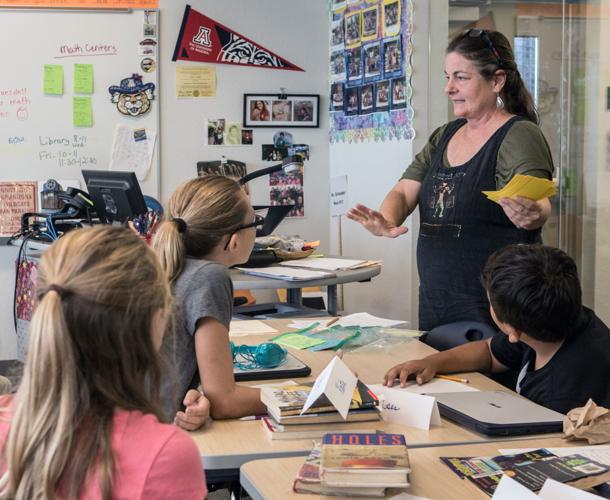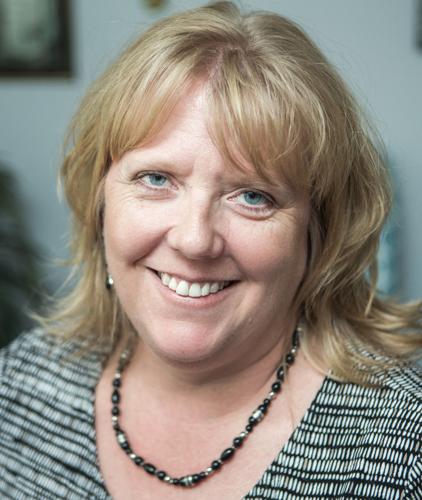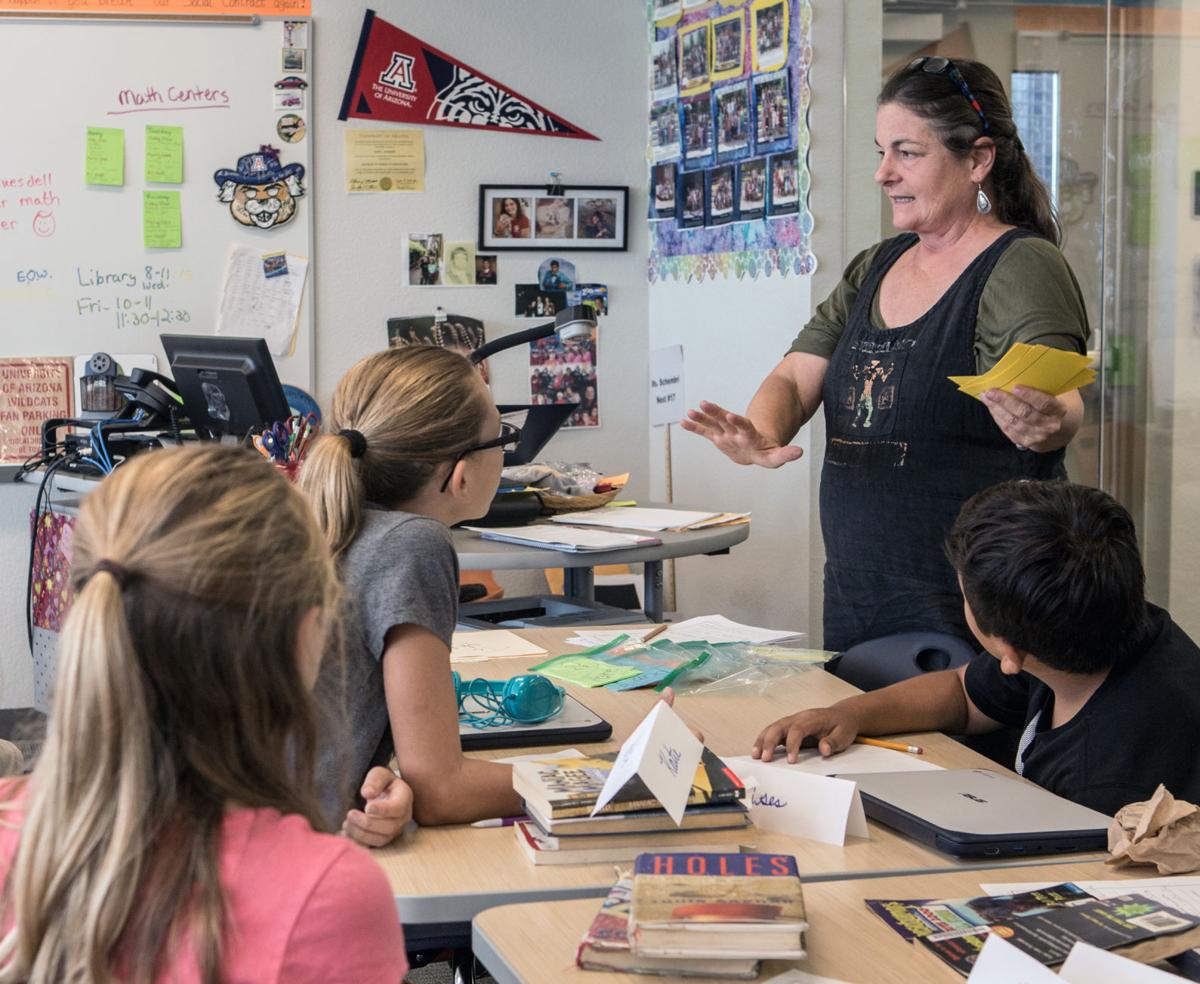Just mentioning the word homework in Amy Foskey’s house has been been known to spark arguments and tears.
But that’s a thing of the past, at least for the Tucson mom’s fourth-grader who attends a school that has abandoned homework in an effort to give families more quality time and to change the way children feel about their educational experience.
Foskey’s daughter attends Picture Rocks Elementary School, a Marana campus that serves more than 600 students in grades K-6. This is the second year the school has tried the no-homework approach and it is receiving rave reviews from families who struggle to balance work, after school activities and dinner time in a span of a few hours.
“I was so relieved and happy when the school decided to do this,” said Foskey who in addition to parenting four children, holds down a part-time job and is a part-time student. “When I tell others, they’re in disbelief.”
At a time when demands are high on students to meet more rigorous standards, families report spending hours completing homework, something that University of Arizona professor Etta Kralovec says is unnecessary.
Kralovec, associate professor of teacher education and author of “The End of Homework,” began researching the impact of homework on children 20 years ago after a case study she conducted on high school dropouts in Maine found that homework contributed to students’ feelings on why they were pushed out of school.
“I was stunned by that finding because I never heard about homework contributing to kids dropping out,” said Kralovec, who reported to the state of Maine that it seemed like homework was pushing out children in poverty.
Kralovec recalls having a great relationship with her own son when he entered middle school, except for when it came to homework, prompting her to look into the subject even further.
“At that point is when I realized the lack of really solid research saying that the pain of homework is overcome by the academic achievement it fosters,” Kralovec said. “Now we know that’s not true and for so many parents, the pain of homework is just that: pain with no payoff.”
For the principal of Picture Rocks Elementary, her experience with her own children is also what prompted Tawnya Caldwell to explore the no-homework policy for her school.

Picture Rocks Elementary School Principal Tawnya Caldwell
“I was a working mom and my husband worked and I hated the battles at the dinner table, after dinner, trying to get the homework done,” she said. “I felt like I was filling out worksheets that meant nothing and it was taking time away from my family and creating a battle between me and my children that I didn’t like.”
When she became principal of Desert Winds K-3 School, which merged with Picture Rocks this year, she was determined to start the conversation with her staff about no longer assigning homework.
That conversation started three years ago and it was met with resistance from some teachers who felt like homework was instilling responsibility in students, Caldwell said.
But at a school where 80 percent of children qualify for free or reduced lunch — an indicator of poverty — Caldwell found that only half of students were completing homework. The other half was forced to come to school and explain that they hadn't finish the assignments, sometimes because they didn’t have anyone at home to help or because their parents weren’t capable of helping them.
“That doesn’t help a child’s self esteem or how they feel about school,” Caldwell said.
Caldwell also shared research with her staff that found that quality time with family and having time to explore individual interests makes for a more well-rounded child than filling out a worksheet does.
What the staff ultimately agreed on was to encourage families to read together every night and if students do not finish work in class, they take it home. The school also caters to a small number of parents who feel strongly about homework, sending packets home when requested.
While it’s too soon to say what kind of impact the decision is having on academic achievement, Caldwell is hopeful that eliminating the stress of homework will enhance students' attitudes about school and that will translate into success.
The Marana School District is also watching to see how the no-homework policy plays out to see whether it could be adopted at other campuses, said spokeswoman Tamara Crawley.
Already, the math department at Mountain View High School has decided to stop requiring homework. Instead, it sends home practice problems that students can complete but it is not collected or graded.
With a middle-schooler and a high school freshman at home, Foskey hopes that the no-homework trend spreads.
When her son attended Picture Rocks last year — the first year the no homework policy was fully in place — she felt he performed better academically than he had in years past. Since he’s moved on to seventh grade at another campus the weight of homework is back and she’s not convinced it is helping.
Instead, she’d like to see teachers take more time to ensure that students fully understand the concepts being taught, like what is happening at Picture Rocks. Kralovec also advocates for that method.
“Really, homework is a black hole,” Kralovec said. “It goes home and the parents don’t really know the subject matter, especially as kids get older.
“As teachers are held accountable for higher standards and as students are held accountable for higher standards, we need to tighten up the learning process so it’s all done under the direction of a well-prepared teacher.”
Across town in Vail, Leah Vigileos, dreams about the day her second-grader doesn’t come home with pages of work to be done, but homework is viewed as beneficial in the Vail School District, which has been named one of the top performing districts in the state.
Rather than fight with her 7-year-old, Vigileos recently let the teacher know she would be limiting how much homework her son does.
“I’m not on homework strike, although I would love to be, but I won’t jeopardize my son’s grades,” Vigileos said. “I’ve talked to the teacher and I told her ‘I’m not going to turn it into a power struggle every day, I will focus on spelling and getting done as much as we can throughout the week’ and she said it was fine, she doesn’t want it to be a huge struggle.”
While homework is valued in Vail, that kind of collaboration is what the district preaches, said Superintendent Calvin Baker.
“Homework is an issue that defies a solution by an edict from the district office,” Baker said. “There are so many variables, it depends so much on the subject matter, the grade level, and the student, so we strongly encourage parents to work directly with the teacher and, if necessary, the principal and try to come up with solutions for their child.”
Baker added, however, that many academic skills are in some ways like athletic skills that need to be practiced in and outside of the classroom.
“There should not be too much stress but some stress is appropriate,” Baker said. “We are preparing our students to be adults in a highly competitive world and I don’t know many adults who live a stress-free life. We all have challenges we have to deal with, so part of what we do is we help students learn how to deal with challenges.”






